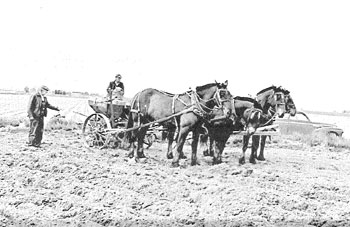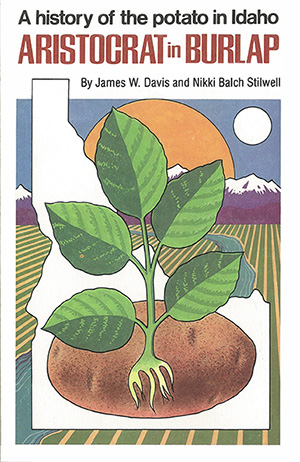 Horses were still used in the 1940s to plant potatoes.
Horses were still used in the 1940s to plant potatoes.
More than anyone else, perhaps Joe Marshall's career paralleled the development of the Idaho potato industry. His tireless energy and his total involvement contributed greatly to his prominence and caused him to be known as the "Idaho Potato King" in trade circles.
Forced to quit school at an early age in his home state of Ohio, Joe Marshall continued his education studying subjects that interested him where and when he could. He had a feeling for civil engineering and became a self-educated civil engineer specializing in the construction of irrigation canals and dams.
He first came to Idaho in 1902. Prior to the opening of the Twin Falls irrigation tract, Joe Marshall had been working for the Milner Brothers, who constructed Milner Dam, which made the Twin Falls tract possible. His trip to Idaho was to inspect the new irrigation project, and he was greatly impressed with the land, the location, and the potential of the Magic Valley as a new agricultural area. As a consequence, he filed on a 160-acre tract east of Twin Falls, a farm operation, which is still owned by the Marshall family.
The years between 1902 and 1916 were spent on a variety of engineering and irrigation projects including a period of time when he purchased and developed land in Mexico. He returned to Idaho to construct an earthen dam at Mackay for an irrigation project in that area. The next year, he went back to his Twin Falls farming operation and produced a crop of 40 acres of potatoes. This was the real start of Joe Marshall's Idaho potato career and was an event that proved to be very influential in the history of the Idaho potato industry.
One of Marshall's greatest personality traits was his ability to attack and solve problems. When trouble developed, he looked for the cause and worked out a solution. An example of this was a trip he made to Chicago in 1917 to induce the railroads to make railcars available for shipments of potatoes from Idaho. While cars were lined up on the siding in Chicago unused, there was a shortage of rolling stock in the Western United States to ship Idaho® potatoes to Eastern markets. He was successful in talking top freight directors of the Union Pacific Railroad into diverting sufficient rolling stock to Idaho, where it was needed, and solved a car shortage that was creating a disaster in the Idaho potato industry.


 Horses were still used in the 1940s to plant potatoes.
Horses were still used in the 1940s to plant potatoes.